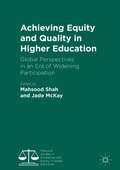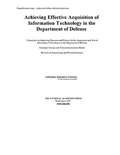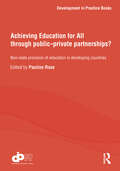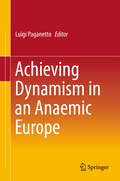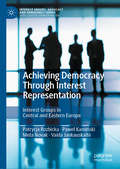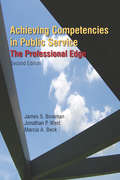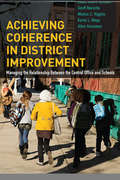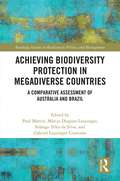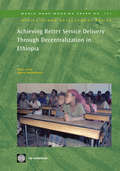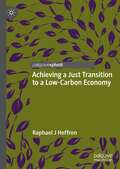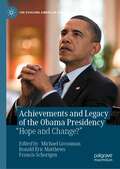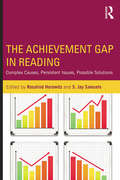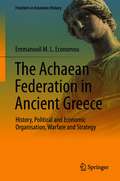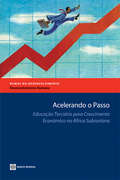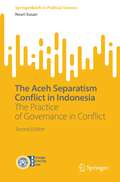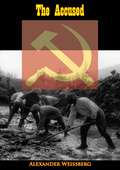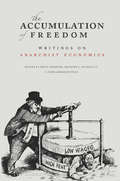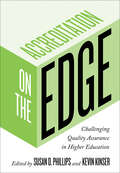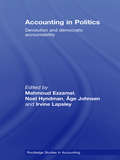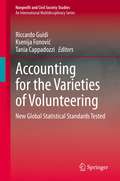- Table View
- List View
Achieving Equity and Quality in Higher Education: Global Perspectives in an Era of Widening Participation (Palgrave Studies in Excellence and Equity in Global Education)
by Mahsood Shah Jade McKayAcross the world, higher education is witnessing exponential growth in both student participation and types of educational providers. One key phenomenon of this growth is an increase in student diversity: governments are widening access to higher education for students from traditionally underrepresented groups. However, this raises questions about whether this rapid growth may in face compromise academic quality. This book presents case studies of how higher education institutions in diverse countries are maintaining academic excellence while increasing the access and participation of students from historically underrepresented backgrounds. Including case studies spanning four continents, the authors and editors examine whether increasing widening participation positively impacts upon academic quality. This volume will be of interest and value to students and scholars of global higher education, representation and participation in education, and quality in higher education.
Achieving Environmental Sustainability in the Sports Sector: Nature Means That Future (SpringerBriefs in Applied Sciences and Technology)
by Ahmet Atalay Biruta ŠvagždienėThis book explores the previously overlooked negative environmental impact of the sports industry, with a particular emphasis on the carbon footprint of sports facilities and organizations. The authors provide a comprehensive assessment of sustainable development goals, economic, social, and environmental sustainability concepts. They reveal the significant negative effects that the sports sector has on the environment and examine the policies implemented by stakeholders in the industry.The book also explores a case study of the legal policies implemented by the Lithuanian government to reduce the environmental impact of sports. The authors present practical suggestions for environmentally-friendly sports management, supported by examples presented with figures, pictures, and tables.This book fills a gap in the literature, offering suggestions and comments to enrich the practices of stakeholders in the sports industry. It provides an opportunity to make a positive difference for the environment while advancing the field of sports management.
Achieving Environmental Justice: A Cross-National Analysis
by Karen BellEnvironmental justice aspires to a healthy environment for all, as well as fair and inclusive processes of environmental decision-making. In order to develop successful strategies to achieve this, it is important to understand the factors that shape environmental justice outcomes. This optimistic, accessible and wide-ranging book contributes to this understanding by assessing the extent of, and reasons for, environmental justice/injustice in seven diverse countries - United States, Republic of Korea (South Korea), United Kingdom, Sweden, China, Bolivia and Cuba. Factors discussed include: race and class discrimination; citizen power; industrialisation processes; political-economic context; and the influence of dominant environmental discourses. In particular, the role of capitalism is critically explored. Based on over a hundred interviews with politicians, experts, activists and citizens of these countries, this is a compelling analysis aimed at all academics, policy-makers and campaigners who are engaged in thinking or action to address the most urgent environmental and social issues of our time.
Achieving Effective Acquisition of Information Technology in the Department of Defense
by National Research Council of the National AcademiesIn the military, information technology (IT) has enabled profound advances in weapons systems and the management and operation of the defense enterprise. A significant portion of the Department of Defense (DOD) budget is spent on capabilities acquired as commercial IT commodities, developmental IT systems that support a broad range of warfighting and functional applications, and IT components embedded in weapons systems. The ability of the DOD and its industrial partners to harness and apply IT for warfighting, command and control and communications, logistics, and transportation has contributed enormously to fielding the world's best defense force. However, despite the DOD's decades of success in leveraging IT across the defense enterprise, the acquisition of IT systems continues to be burdened with serious problems. To address these issues, the National Research Council assembled a group of IT systems acquisition and T&E experts, commercial software developers, software engineers, computer scientists and other academic researchers. The group evaluated applicable legislative requirements, examined the processes and capabilities of the commercial IT sector, analyzed DOD's concepts for systems engineering and testing in virtual environments, and examined the DOD acquisition environment. The present volume summarizes this analysis and also includes recommendations on how to improve the acquisition, systems engineering, and T&E processes to achieve the DOD's network-centric goals.
Achieving Education for All through Public–Private Partnerships?: Non-State Provision of Education in Developing Countries (Development in Practice Books)
by Pauline RoseConcern for achieving Millennium Development Goals (MDGs) by 2015 has led to a focus on the role that non-state providers (NSPs) can offer in extending access and improving quality of basic services. While NSPs can help to fill a gap in provision to those excluded from state provision, recent growth in both for-profit and not-for-profit providers in developing countries has sometimes resulted in fragmentation of service delivery. To address this, attention is increasingly given in the education sector to developing ‘partnerships’ between governments and NSPs. Partnerships are further driven by the expectation that the state has the moral, social, and legal responsibility for overall education service delivery and so should play a role in facilitating and regulating NSPs.Even where the ultimate aim of both non-state providers and the state is to provide education of acceptable quality to all children, this book provides evidence from diverse contexts across Africa, South Asia, and Latin America to highlight the challenges in them partnering to achieve this. This book was published as a special issue of Development in Practice.
Achieving Dynamism in an Anaemic Europe
by Luigi PaganettoThis book explores the reasons behind Europe's poor performance in terms of overall growth and its progressively diminishing role in the global context. Recognizing that the big challenge is to restore confidence and hope in Europe, potential solutions are discussed. The volume comprises a selection of contributions to the XXVI Villa Mondragone International Economic Seminar (Rome, 2014), the most recent of a series of seminars that have provided outstanding scholars with an opportunity to discuss key topics in economic research. In recent years the persistence of high unemployment and low growth has increased the Euroscepticism that has targeted the euro and the Brussels bureaucracy. Readers will find this book a fascinating source of information on current thinking regarding topics such as European industrial policy, European governance, unemployment, the euro and competitiveness, trade and financial integration, the Transatlantic Trade and Investment Partnership, anticorruption policies, and energy and climate policies. In particular, it examines the structural reforms and commitment to development that will be required for Europe to become a region characterized by social justice, dynamism, and opportunities for all.
Achieving Democracy Through Interest Representation: Interest Groups in Central and Eastern Europe (Interest Groups, Advocacy and Democracy Series)
by Patrycja Rozbicka Paweł Kamiński Meta Novak Vaida JankauskaitėThis book assesses the quality of democracy through the study of organized interests in Central and Eastern Europe (CEE) since the collapse of communism in 1989 up to 2017. It offers a much-needed comprehensive look into formal interest representation in CEE countries and compares this with the model in Western democracies. Drawing on democratic theory and comparative analysis, the authors explore the effects of a legal framework, political as well as social contexts. The volume contributes to debates on the performance of young democracies in CEE, where scholars argue that there is a ‘democratic crisis’ and democratic fatigue while the interest group system is often labelled as weak and, in some cases, underdeveloped. Although great efforts have been made to deepen our understanding of interest organization and lobbying tools, the current literature fails to provide a comprehensive answer on the influence of unsupportive environments on population ecology. The case of CEE countries shows significant effects of political and social contexts on interest representation, stimulating a debate about the quality of democratic institutions following the collapse of communism.
Achieving Competencies in Public Service: The Professional Edge
by James S. Bowman Jonathan P. West Marcia A. BeckThe new context and character of public service - shifting values, entrepreneurship, information technology, and multi-sector careers - require a 'skills triangle' of technical, ethical, and leadership abilities. This concise and readable work focuses on these three essential skills, and describes what it means to be a consummate professional public servant. Essential reading for both professionals and students, "Achieving Competencies in Public Service: The Professional Edge" sets standards for anyone who conducts the public's business, and links them with performance management, human resource administration, and information technology skills. Filled with original illustrative examples, case studies, and exemplar profiles, the book is an ideal supplement for any introductory course in Public Administration.
Achieving Coherence in District Improvement: Managing the Relationship Between the Central Office and Schools
by Allen S. Grossman Geoff Marietta Karen L. Mapp Monica C. Higgins Susan Moore JohnsonAchieving Coherence in District Improvement focuses on a problem of practice faced by educational leaders across the nation: how to effectively manage the relationship between the central office and schools. The book is based on a study of five large urban districts that have demonstrated improvement in student achievement. The authors—all members of Harvard University’s Public Education Leadership Project (PELP)—argue that there is no “one best way” to structure the central office-school relationship. Instead, they say, what matters is whether district leaders effectively select and implement their strategy by achieving coherence among key elements and actors—the district’s environment, resources, systems, structures, stakeholders, and culture. The authors examine the five districts’ approaches in detail and point to a number of important findings. First, they emphasize that a clear, shared understanding of decision rights in key areas—academic programming, budgeting, and staffing—is essential to developing an effective central office-school relationship. Second, they stress the importance of building mutually supportive and trusting relationships between district leaders and principals. Third, they highlight the ways that culture and the external environment influence the relationship between the central office and schools. Each chapter also provides relevant “Lessons for Practice”—actionable takeaways—that educational leaders from any district can use successfully to improve the central office-school relationship.
Achieving Coherence in District Improvement: Managing the Relationship Between the Central Office and Schools
by Susan Moore Johnson Geoff Marietta Monica C. Higgins Karen L. Mapp Allen S. GrossmanAchieving Coherence in District Improvement focuses on a problem of practice faced by educational leaders across the nation: how to effectively manage the relationship between the central office and schools. The book is based on a study of five large urban districts that have demonstrated improvement in student achievement. The authors—all members of Harvard University&’s Public Education Leadership Project (PELP)—argue that there is no &“one best way&” to structure the central office-school relationship. Instead, they say, what matters is whether district leaders effectively select and implement their strategy by achieving coherence among key elements and actors—the district&’s environment, resources, systems, structures, stakeholders, and culture. The authors examine the five districts&’ approaches in detail and point to a number of important findings. First, they emphasize that a clear, shared understanding of decision rights in key areas—academic programming, budgeting, and staffing—is essential to developing an effective central office-school relationship. Second, they stress the importance of building mutually supportive and trusting relationships between district leaders and principals. Third, they highlight the ways that culture and the external environment influence the relationship between the central office and schools. Each chapter also provides relevant &“Lessons for Practice&”—actionable takeaways—that educational leaders from any district can use successfully to improve the central office-school relationship.
Achieving Biodiversity Protection in Megadiverse Countries: A Comparative Assessment of Australia and Brazil (Routledge Studies in Biodiversity Politics and Management)
by Paul Martin Márcia Dieguez Leuzinger Solange Teles da Silva Gabriel Leunziger CoutinhoThis volume systematically analyses why legal doctrines for the protection of biodiversity are not sufficiently effective. It examples implementation in Australia and Brazil, two megadiverse countries with very differing legal and cultural traditions and natural environments. Substantial effort goes into the development and interpretation of legal doctrines for the protection of biodiversity in national and international law. Despite this, biodiversity continues in steep decline. Nowhere is this more evident than in megadiverse countries, such as Australia and Brazil, which possess the greatest number and diversity of animals and plants on Earth. The book covers a wide range of topics, including farming, mining, marine environments, indigenous interests and governance. Achieving Biodiversity Protection in Megadiverse Countries highlights specific causes of underperformance in protecting diverse terrestrial and marine environments. It provides proposals for more effective implementation in these two jurisdictions, relevant to other megadiverse territories, and for biodiversity protection generally. Each chapter was written by teams of Australian and Brazilian authors, so that similar issues are considered across both jurisdictions, to provide both country-specific and generalisable insights. Achieving Biodiversity Protection in Megadiverse Countries will be of great interest to students and scholars of environmental law and governance and biodiversity conservation, as well as policymakers, practitioners and NGOs working in these fields.
Achieving Better Service Delivery Through Decentralization in Ethiopia
by Andrew Sunil Rajkumar Marito GarciaAchieving Better Service Delivery Through Decentralization in Ethiopia examines the role decentralization has played in the improvement of human development indicators in Ethiopia. Ethiopia has made major strides in improving its human development indicators in the past 15 years, achieving significant increases in the coverage of basic education and health services in a short period of time. Improvements took place during a period of massive decentralization of fiscal resources, to the regions in 1994 and to woredas in 2002-03. The devolution of power and resources from the federal and regional governments to woredas appears to have improved the delivery of basic services. Surveys of beneficiaries reveal that they perceive that service coverage and quality have improved. Beneficiary satisfaction has increased markedly in education, and less conspicuously in water and health services. In the south, the decentralization to woredas in 2002-03 tended to narrow differences in per capita expenditures on education and health across woredas. Decentralization disproportionately favored woredas that are remote (more than 50 kilometers from a zonal capital), food-insecure, and pastoral, suggesting that decentralization has been pro-poor. Decentralization also narrowed the gap in educational outcomes between disadvantage and better-off woredas, especially in the south. Pastoral, food-insecure, and remote woredas gained in terms of the educational outcomes examined (gross enrollment rates, grade 8 examination pass rates, repetition rates, pupil-teacher ratios, and teacher-section ratios).
Achieving a Just Transition to a Low-Carbon Economy
by Raphael J HeffronThe ambition of most countries across the world is to develop a low-carbon economy, evidenced by the fact that the vast majority of countries have signed the Paris COP21 agreement. This book contends that this global societal transition to a low-carbon economy must be just. As such, it will be an invaluable and accessible reference for scholars from all research disciplines who aim in their research to see a fairer, more equitable and inclusive world where sustainability is at the fore and climate targets are achieved.This is the first in-depth and original analysis to explore the central importance of law in achieving a just transition to a low-carbon economy. In addition, it advances the JUST framework, a unique framework for assessing the just transition. This important research and theoretical tool provides a practical perspective as it ensures the geographical space and timelines of development are factored into analysis. The research also provides analysis on the just transition movement around the world and the influence of international institutions.Through several case studies on Just Transition Commissions and Critical Mineral Development, the book details and demonstrates key elements of justice, including distributive, procedural, restorative, recognition, and cosmopolitan justice. It is clear from the analysis that while these are vast areas for analysis, if applied in practice, they all centrally contribute to ensuring society will advance in achieving a just transition to a low-carbon economy.
Achievements and Legacy of the Obama Presidency: “Hope and Change?” (The Evolving American Presidency)
by Michael Grossman Francis Schortgen Ronald Eric MatthewsThis book provides a broad analysis of the legacy of the Obama presidency, representing multiple perspectives across the partisan and disciplinary divides. The chapters in this book are grouped into three major legacy categories: domestic policy, foreign policy, and rhetoric. Domestically, the contributors examine the “Obama coalition” and its staying power in the age of Trump, President Obama's legacy regarding the use of executive power, his impact on intergovernmental relations, and his impact on the welfare state and education. On the foreign policy front, the central focus is on whether Obama was in fact much different from his predecessor, what impact he had on the Middle East and Afghanistan, and whether his pivot to Asia yielded the hoped-for results. The contributions in this book also aim to (re-)assess the Obama legacy in light of the subsequent efforts by his successor to undo many of the policies embraced and implemented during the Obama years.
The Achievement Gap in Reading: Complex Causes, Persistent Issues, Possible Solutions
by Rosalind Horowitz S. Jay SamuelsIn this volume prominent scholars, experts in their respective fields and highly skilled in the research they conduct, address educational and reading research from varied perspectives and address what it will take to close the achievement gap—with specific attention to reading. The achievement gap is redefined as a level at which all groups can compete economically in our society and have the literacy tools and habits needed for a good life. Bringing valuable theoretical frameworks and in-depth analytical approaches to interpretation of data, the contributors examine factors that contribute to student achievement inside the school but which are also heavily influenced by out-of-school factors—such as poverty and economics, ethnicity and culture, family and community stratifications, and approaches to measurement of achievement. These out-of-school factors present possibilities for new policies and practice. The overarching theme is that achievement gaps in reading are complex and that multiple perspectives are necessary to address the problem. The breadth and depth of perspectives and content in this volume and its conceptualization of the achievement gap are a significant contribution to the field.
The Achaean Federation in Ancient Greece: History, Political and Economic Organisation, Warfare and Strategy (Frontiers in Economic History)
by Emmanouil M. EconomouThis book analyses ancient Greek federalism by focusing on one of the most organised and advanced Greek federal states, the Achaean Federation Sympoliteia. Unlike earlier studies that mainly focused on its political history, this book adopts an interdisciplinary approach, analysing aspects of the economic organization and institutions, and the political economy of the Achaean Federation, and combining these findings with political history. It also discusses the strategic choices made by significant historical figures such as generals Aratos and Philopoemen. The analysis of the Achaean Federation verifies the intertemporal federal axiom, which states that the success and viability of federal experiment is achieved when the benefits of participation for the member-states exceed the costs of conferring national sovereignty on supranational federal authorities.The book further argues that the Achaeans developed a system of sophisticated direct democratic procedures in decision-making on federal matters, as well as significant and highly sophisticated (for the era) economic institutions and federal practices, in order to achieve bonds of trust and legitimacy regarding their innovative federal structure. These practices included, among others, the creation of free market type economic institutions, a monetary union, federal budget, provision of public goods and a common defense and security policy for all the Achaean city-state members. Lastly, the book relates these findings to ideas on how the Achaean Federation would have dealt with a series of current global issues, such as European Union integration and problems such as Euroscepticism, Brexit and immigration.
Acelerando o Passo
by Desenvolvimento HumanoO restabelecimento do crescimento económico que se tem registado por toda a África Subsariana (ASS) desde o início do milénio constitui um desenvolvimento encorajador. Sustentá-lo para sempre é não só uma necessidade mas também um desafio de primeira ordem. Num mundo globalizado, a chave do sucesso económico reside, cada vez mais, no grau de eficácia com que um país consegue assimilar o conhecimento disponível e desenvolver vantagem comparativa em áreas seleccionadas com boas perspectivas de desenvolvimento. Aumentar a relevância da educação terciária e da investigação na África Austral permitirá à Região aumentar a sua vantagem comparativa alargando as fronteiras da tecnologia através de inovação, estimular a diversificação de produtos e serviços, e maximizar os retornos de bens de capital com uma mais eficiente alocação e gestão de recursos. Os países africanos registaram grandes avanços na aquisição de altos níveis de literacia e no aumento das matrículas no ensino primário, um progresso que cria alicerces para desenvolvimento futuro. Agora é necessário que avancem rapidamente para a aquisição de qualificaçães e especializaçães de nível superior que lhes permitam acrescentar valor à s actividades económicas existentes e lançar-se em novas indústrias e serviços. 'Acelerando o Passo: Educação Terciária para Crescimento Económico na África Subsariana' apresenta em detalhe argumentos para um maior crescimento do conhecimento intensivo, solicitando uma maior atenção à educação secundária e, principalmente, à educação pós-secundária. Nele se demonstra por que razão os sistemas de ensino superior da África Subsariana deverão procurar um maior alinhamento com as estratégias nacionais de desenvolvimento económico e redução da pobreza, e se identificam os benefícios que poderão associar-se a essa mudança de perspectiva. Será, pois, um livro do maior interesse para organizaçães internacionais, governos, instituiçães de pesquisa e universidades de toda a região.
The Aceh Separatism Conflict in Indonesia: The Practice of Governance in Conflict (SpringerBriefs in Political Science)
by Novri SusanThis book is the first to analyse the practice of governance to resolve conflict in the case of Aceh in Indonesia. Combining theoretical discourse on conflict, democracy, and governance, it draws from original field research on the separatist conflict, utilizing a social constructivist approach in collating observations and interviews with political elites from both the Government of Indonesia and the Aceh Independent Movement (GAM). The conflict was an intractable one in which thousand civilians were killed between 1976 and 2006. The author zooms into the 2003 and 2007 period, against the broader context of the political landscape of Indonesia under the Suharto regime. In doing so, the book tackles the challenges presented by intrastate conflicts relating to ethno-religiosity, land use, and separatism. It unpacks the Indonesian political system’s shift from an authoritarian regime to a democratic one, and demarcates the prevalence of state violence in managing conflicts, as exemplified in the Aceh separatism conflict. Relevent to political scientists and scholars in peace, conflict and development studies, this co-published book presents novel sociological insights into Indonesia’s historical, and contemporary, political landscape.
The Accused
by Edward Fitzgerald Arthur Koestler Alexander WeissbergFirst published in 1951, this is both a personal narrative and forensic analysis of the methods employed by Stalin and the G.P.U. during the Great Purge from the middle of 1936 to the end of 1938.It is the exploration of the systematic imprisonment, interrogation and extraction of false confessions from millions of people that is extraordinary. Weissberg explains how victims of the state police were forced to make confessions incriminating not only themselves but also co-conspirators. This practice was aimed at destroying the relations of trust between those who were responsible for the Russian revolution. Those who were not killed in camps in the Soviet Arctic were divided and conquered.Hence, the central thesis in the book is that the Russian revolution and communism in the Soviet Union were irrevocably destroyed and ended in the 1930s during the terror of the Stalinist purges.A remarkable and little known contribution to our understanding of the events in the Soviet Union.
The Accumulation of Freedom
by Anthony J. Nocella II Michael Albert Deric Shannon Iain Mckay John AsimakopoulosThe only crisis of capitalism is capitalism itself. Let's toss credit default swaps, bailouts, environmental externalities and, while we're at it, private ownership of production in the dustbin of history. The Accumulation of Freedom brings together economists, historians, theorists, and activists for a first-of-its-kind study of anarchist economics. The editors aren't trying to subvert the notion of economics--they accept the standard definition, but reject the notion that capitalism or central planning are acceptable ways to organize economic life. Contributors include Robin Hahnel, Iain McKay, Marie Trigona, Chris Spannos, Ernesto Aguilar, Uri Gordon, and more.
Accreditation on the Edge: Challenging Quality Assurance in Higher Education
by Edited by Susan D. Phillips and Kevin KinserA behind-the-scenes look at how college and university accreditation affects your education—and the value of your degree.Accreditation is essential to colleges and universities. Without it, they are unable to participate in federal student aid programs or confer legitimate degrees. In Accreditation on the Edge, Susan D. Phillips and Kevin Kinser bring together the expertise of different stakeholders to illustrate the complexities of the accreditation system and to map the critical issues that must be navigated going forward. Accreditation can be seen both as an invaluable resource and as a barrier to needed reform. Presenting an array of different perspectives—from accreditors and institutions to policymakers and consumers—the book offers nuanced views on accreditation's importance to higher education and on the potential impact of proposed reforms. The contributors reveal that accreditation is currently on the edge of a policy precipice, as the needs of higher education and the interests of the many stakeholders may well outstrip its ability to perform. But, they argue, accreditation is also on the cutting edge of the transformation of higher education in the twenty-first century.Intended for policymakers, accreditors, institutional leaders, and scholars in higher education, Accreditation on the Edge offers a comprehensive analysis of the critical issues that accreditation reform needs to address if it is to serve the future of a fast-changing higher education environment. Contributors: Armand Alacbay, David A. Bergeron, Alana Dunagan, Judith S. Eaton, Peter T. Ewell, Madeleine F. Green, Thomas L. Harnisch, Michael B. Horn, Kevin Kinser, Edwin W. Koc, Paul J. LeBlanc, Sylvia Manning, Leah K. Matthews, Barmak Nassirian, Anne Neal, Audrey Peek, Susan D. Phillips, Mark Schneider, Jamienne S. Studley, Joseph Vibert
Accounting in Politics: Devolution and Democratic Accountability (Routledge Studies In Accounting Ser. #Vol. 5)
by Mahmoud Ezzamel Noel Hyndman Åge Johnsen Irvine LapsleyThis book looks at the effectiveness of the 1999 restructuring of the UK through the establishment of the Scottish Parliament and the Assemblies for Northern Ireland and Wales, considering the process of devolution and its consequences on the key mechanisms of accounting and democratic accountability. Many of the chapters in this book examine wheth
Accounting for the Varieties of Volunteering: New Global Statistical Standards Tested (Nonprofit and Civil Society Studies)
by Riccardo Guidi Ksenija Fonović Tania CappadozziFor a long time, volunteering lacked standardized data sets allowing methodologically robust comparative analyses and global policy making. Starting from 2011, the International Labour Office (ILO) and the United Nations (UN) have provided global statistical standards for organization-based and direct volunteering which offer path-breaking opportunities.The global statistical standards on volunteering are however only relatively known. They also have to face difficult methodological and substantial challenges: Can they really account for the local varieties of volunteering in the different areas of the world? Does their adoption further develop our knowledge of volunteering both at national and international level?Beyond illustrating which innovations these statistical standards bring and critically assessing the tensions between the global guidelines and the local differences, the book shows how the ILO and the UN standards can be implemented into national statistics and which advancements in the understanding of characters, antecedents and impacts of contemporary organization-based and direct volunteering they allow. The Volume takes Italy as an illustrative case that offers global value. This multidisciplinary book demonstrates that a holistic approach to the implementation of the ILO and UN guidelines permits to virtuously balance international statistical standards and locally embedded cultures as well as to move knowledge of volunteering forward in a complexity-driven agenda. The book provides tools, evidences and inspiration for scholars, statistical agencies, practitioners and policy-makers.
